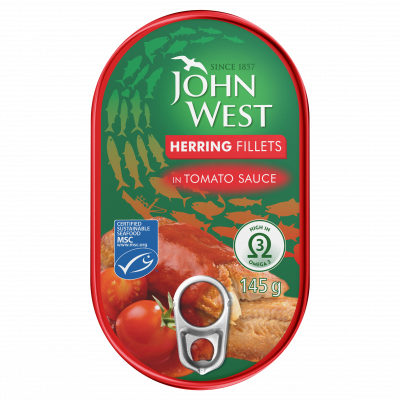
Native to UK shores, herring is both a traditional favourite and an excellent source of nutrition: boasting fatty acids and Vitamin B12 amongst its nutritional content. This salty, oily fish is as versatile to cook with as it is delicious raw (or with a pinch of lemon), making it one of the most popular tinned products we sell.

HOW ARE JOHN WEST HERRINGS SOURCED?
Our herring are caught in the NE Atlantic, North Sea and Baltic Sea, before being transported to a canning plant in Gniewino, Poland to be hand-packed and transported.
FAQ'S
Herrings and sardines are part of the same fish family. When they’re younger and smaller, herrings are referred to as sardines, which actually means “small fish”. Both are high in protein and good sources of vitamin D and zinc, however they do differ in taste and texture. Sardines have a fishier, oilier, saltier taste as well as a meatier texture. Herring, though, does provide a higher percentage of B vitamins, and slightly more omega-3 fatty acids.
Sardines are an oily fish, rich in omega-3 fatty acids. Oily fish has been linked to a number of body and brain benefits, with fatty acids having been shown to reduce inflammation, support mental health, and potentially lower the risk of cardiovascular disease.
Herring is an excellent source of lean protein. This oily fish is packed with nutrients including body-boosting omega-3 fatty acids, various antioxidants, and high levels of vitamins D and B12. Not only does it have its own unique, tasty flavour, it is a fantastic addition to a healthy diet.